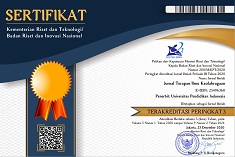The Relationship Between Teacher's Interpersonal Behaviour and Student Engagement and Sport Values in Physical Education
Abstract
Keywords
Full Text:
PDFReferences
Ali, M. M., & Hassan, N. (2018). Defining concepts of student engagement and factors contributing to their engagement in schools. Creative Education, 9(14), 2161–2170. https://doi.org/10.4236/ce.2018.914157
Atkinson, J., & David, M. (2019). A pedagogical guide to teaching an interpersonal communication course. Journal of Communication Pedagogy, 2, 27–32. https://doi.org/10.31446/JCP.2018.02
Beni, S., Ní Chróinín, D., & Fletcher, T. (2021). “It’s how PE should be!”: Classroom teachers’ experiences of implementing meaningful physical education. European Physical Education Review, 27(3), 666–683. https://doi.org/10.1177/1356336X20984188
Fakhriddin Khurramovich, K. (2022). The main values of physical education and sport. British Journal of Global Ecology and Sustainable Development, 4(June). https://www.scholarexpress.net/
Hoa, N. V., Dung, P. X., & Chi, H. (2021). Reality of students’ engagement in physical education. International Journal of Physical Research, 5(1), 34–42.
Hooper, O., Sandford, R., & Jarvis, H. (2020). Thinking and feeling within/through physical education: What place for social and emotional learning? In Threshold Concepts in Physical Education (pp. 137–148). Routledge. https://doi.org/10.4324/9780429342264-10
Jammu, G., Ahmed, I. A., Akhter, S., & Ahmed, A. (2021). Need and importance of physical education for school students. International Journal of Physiology, 6(1), 352–355.
Jarl, M., Andersson, K., & Blossing, U. (2021). Organizational characteristics of successful and failing schools: A theoretical framework for explaining variation in student achievement. School Effectiveness and School Improvement, 32(3), 448–464. https://doi.org/10.1080/09243453.2021.1903941
Leo, F. M., Mouratidis, A., Pulido, J. J., López-Gajardo, M. A., & Sánchez-Oliva, D. (2020). Perceived teachers’ behavior and students’ engagement in physical education: The mediating role of basic psychological needs and self-determined motivation. Physical Education and Sport Pedagogy, 27(1), 59–76. https://doi.org/10.1080/17408989.2020.1850667
Moore, K., & Shemberger, M. (2019). Mass communication andragogy for teaching online adult learners. Journal of the AEJMC Small Programs Interest Group, 9(1), 35–40.
Richard M. Ryan. (2023). The Oxford handbook of self-determination theory (R. M. Ryan, Ed.). Oxford University Press. https://doi.org/10.1093/oxfordhb/9780197600047.001.0001
Rone, N., Guao, N. A., Jariol, M., Acedillo, N., Balinton, K., & Francisco, J. (2023). Students’ lack of interest, motivation in learning, and classroom participation: How to motivate them? Psychology and Education: A Multidisciplinary Journal, 7(8), 636–645. https://doi.org/10.5281/zenodo.7749977
Ryan, R. M., Deci, E. L., Vansteenkiste, M., & Soenens, B. (2021). Building a science of motivated persons: Self-determination theory’s empirical approach to human experience and the regulation of behavior. Motivation Science, 7(2), 97–110. https://doi.org/10.1037/mot0000194
Saro, J. M., Manliguez, M. E., Jean, I., Buar, M., Buao, A. B., & Almonicar, A. S. (2022). New normal education: Strategies, methods, and trends of teaching-learning on students’ perspectives and its effectiveness. Psychology and Education: A Multidisciplinary Journal, 2022(1), 316. https://doi.org/10.5281/zenodo.7242770
Sarumaha, M. S. (2021). The role of the teacher to construct teaching and learning activities creating a freedom to learn (Action Research Study). Journal of Physics: Conference Series, 1764(1), 012098. https://doi.org/10.1088/1742-6596/1764/1/012098
Tilga, H., Hein, V., & Koka, A. (2017). Measuring the perception of the teachers’ autonomy-supportive behavior in physical education: Development and initial validation of a multi-dimensional instrument. Measurement in Physical Education and Exercise Science, 21(4), 244–255. https://doi.org/10.1080/1091367X.2017.1354296
Toshboyeva, M. B. (2021). Innovative pedagogical activity: Content and structure. European Journal of Life Safety and Stability, 11(December), 231–237. http://www.ejlss.indexedresearch.org/
Utami, P. T., & Hasanah, N. (2020). Good teacher, qualified teacher, and professional teacher: Facing the 21st-century global changes. Ahmad Dahlan Journal of English Studies, 7, 2477–2879. https://doi.org/10.26555/adjes.v7i1.14531
DOI: https://doi.org/10.17509/jtikor.v10i1.84031
Refbacks
- There are currently no refbacks.
Copyright (c) 2025 Tiona Marnida, Fadri Sidiq, Yunyun Yudiana, Kuston Sultoni
License URL: https://creativecommons.org/licenses/by-sa/4.0/





